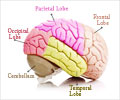Learning to play a musical instrument enhances the brain activity of children and reduces feelings of anxiety in their later years of life.

Professor of psychiatry Dr. James Hudziak and colleagues decided to investigate whether positive stimulation in the form of musical training would have any effect on cortical thickening.
Using magnetic resonance imaging (MRI) data, cortical thickening and thinning in particular areas of the brain had been demonstrated by the team to indicate mental conditions such as anxiety, depression and attention problems, even in children who were undiagnosed with any form of mental disorder.
The team found that learning a musical instrument could help children to reduce feelings of anxiety, gain a greater control of their emotions and give a stronger focus to their attention.
A total of 232 children, aged 6-18, participated in the study and were recruited from National Institutes of Health (NIH) MRI Study of Normal Brain Development.
Each participant underwent MRI scanning and behavioral testing on up to three different occasions with a 2-year interval between each one.
Also, musical training was associated with cortical thickening in areas of the brain related to executive functioning, inhibitory control and the processing of emotions. These include working memory, control of attention, as well as organization and planning for the future.
The findings of the study support The Vermont Family Based Approach - a model constructed by Dr. Hudziak in order to establish that every aspect of a young person's environment, from the people they interact with to the activities they are involved with, contributes to their psychological health.
The findings suggest that there is a great scope for musical training to be used in the treatment of psychological disorders among children. "Music is a critical component in my model," says Dr. Hudziak. "We treat things that result from negative things, but we never try to use positive things as treatment."
Source-Medindia
 MEDINDIA
MEDINDIA




 Email
Email








